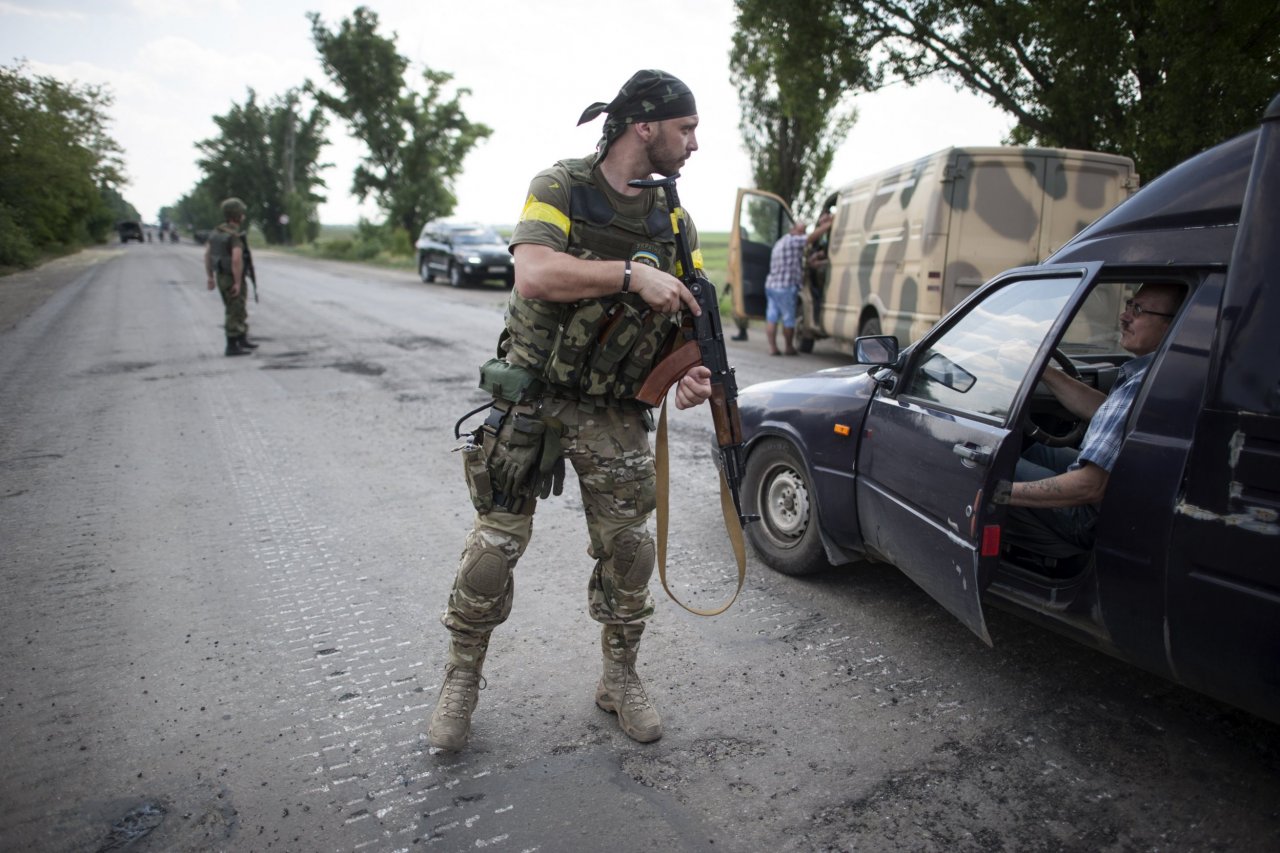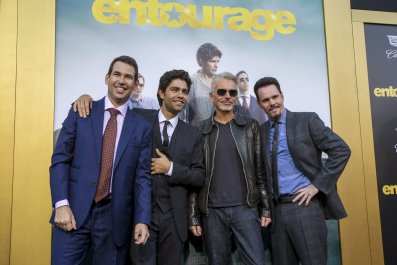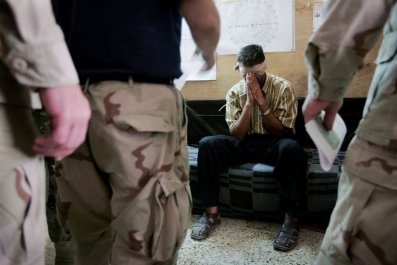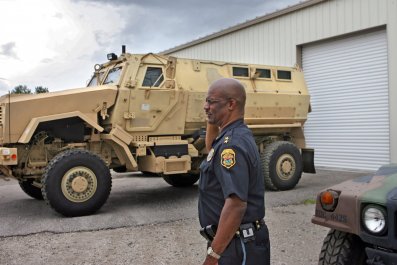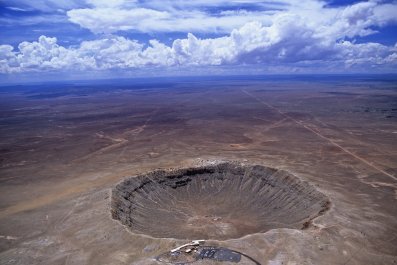Is Vladimir Putin mounting a charm offensive, a military offensive or both? Last month, Russia's president greeted U.S. Secretary of State John Kerry with conspicuous warmth at a newly built palace in Sochi for their first meeting since the beginning of the Ukraine crisis. They talked about eastern Ukraine's future not as a piece of Russia, nor as a Kremlin-backed breakaway republic, but under the rule of Kiev. Summoning his friendliest smile, Putin proclaimed at his annual spring press conference that his country "has no enemies." And as if on cue, the Russian-backed leaders of Ukraine's breakaway regions announced that the idea of Novorossiya—a czarist-era term describing a swath of southern Ukraine that Putin used to hint belonged back under Moscow's control—is officially dead.
"The Kremlin has effectively admitted defeat, no matter how it tries to spin it," wrote Andrei Kolesnikov of the Carnegie Moscow Center. "Moscow seems to have come to the realization that Ukraine has been lost."
Yet at the same time, early June saw the first major breakdown of a fragile cease-fire in Ukraine, as separatist forces battled with tanks and rocket launchers for control of Maryinka and Krasnohorivka. That might signal the start of a major rebel push to take the strategic port of Mariupol. And, more worrisome, observers from the Organization for Security and Cooperation in Europe as well as Western embassies have reported that since early May, Russia has been sending rebels the kind of hardware they need for a major assault on Ukrainian lines—from UR-77 Meteorit mine-clearing vehicles to engineering units trained to deploy floating pontoon bridges. On May 17, Ukrainian troops intercepted a Russian reconnaissance team that had surreptitiously crossed the Seversky Donets River, north of Luhansk, and captured two Russians after a firefight. Both admitted being members of the 3rd Spetsnaz Brigade, on a mission to probe weaknesses in the Ukrainian defenses.
A few days later, Ukrainians shot down a Russian-made Forpost drone, the most sophisticated in Moscow's armory, which had been scanning Ukrainian positions near Mariupol. "If they break through in Maryinka, our forces could be encircled," Valentin Manko, deputy commander of a battalion of Ukrainian volunteers known as Dnepr-1, told Ukrainian television on June 2, warning that the offensive could become "a new Debaltsevo," a reference to an important Kiev-held railhead that fell to Russian-backed rebels in mid-February.
Russia's Spetznaz special forces call the art of concealing your true intentions to confuse the enemy maskirovka. But is Putin's diplomacy just maskirovka—or is he truly looking for a face-saving way to terminate his Ukrainian adventure? In one sense, the war is in its endgame, whether the Kremlin likes it or not. Rebels may yet expand their territory a little, but the dream of many Russian imperial nostalgists that great swaths of Russian-speaking Ukraine would flock to join Moscow has faded. Many major cities in central Ukraine, such as Kharkov, Odessa and Dnipropetrovsk, are home to majority Russian-speaking populations, and yet they strongly support Kiev and are covered in symbols of Ukrainian nationhood, from flags in apartment windows to traffic bollards, fences and clothes in the national colors of yellow and blue.
Russian-speaking Dnipropetrovsk has supplied two of the fiercest volunteer battalions to the front line, Dnipro-1 and Dnipro-2, financed by two oligarchs who are prominent members of the local Jewish community. "Ukraine's population is only 17 percent ethnically Russian," says Steven Pifer, a senior fellow at the Brookings Institution and former U.S. ambassador to Ukraine. "Putin always mangled this fact, claiming that 17 million Ukrainians were ethnic Russians, which would equate to 37 percent of the population." If anything, Pifer says, "Russia's aggression appears to be erasing the dividing line.... One unintended consequence of the conflict is [a new] sense of Ukrainian unity."
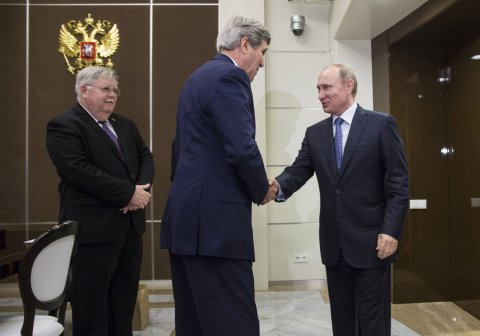
Putin also miscalculated the cost of the war. Annexing Crimea brought Putin tremendous short-term glory—but the resulting U.S. and European Union sanctions, in conjunction with falling oil prices, sent the Russian economy into a tailspin. The ruble lost half its value, and, despite a muted recovery in oil and a boost to industry from the devaluation, Russia's economy is set to shrink by 2.7 percent this year, according to a World Bank report. Yet Putin waved off the economic impact in April, claiming that "nothing burst, everything's working." But Russia's banking sector could collapse if sanctions are extended or tightened, for instance by excluding Russia from the SWIFT international payment system. If that happens, the fragile feeling of normalcy that still prevails in Moscow's markets, restaurants and shopping centers would quickly evaporate as the country's money flow seizes up.
Kerry's visit signaled that the West is ready to begin a delicate diplomatic dance to reach a lasting political settlement in Ukraine. Everyone—even, it seems, the Kremlin—agrees that the rebel areas of Donetsk and Luhansk will remain inside Ukraine. The crucial question is, With what degree of autonomy? If the recent fate of Yugoslavia is anything to go by, it's a vital question if Ukraine is to remain a viable state.
The Kremlin is pressing for Ukraine to become a federation like Bosnia, which was divided at the 1995 Dayton Accords into a pro-Western Bosnian-Croat area and the Republika Srpska, backed by neighboring Serbia. Both are de facto autonomous states within a state with their presidents, parliaments and courts. Bosnia's "central government, with its tripartite presidency and ethnically fractured parliament, [is] largely impotent," says Brian Whitmore, author of the influential The Power Vertical blog. "Bosnia remains a dysfunctional state. And nearly a decade after [Slobodan] Milosevic's death, Serbia continues to use Republika Srpska to paralyze and manipulate the country and cripple its efforts to join mainstream Europe." Kiev would much prefer to see an arrangement akin to that of Srpska Krajina, an ethnic Serbian slice of Croatia that was given some initial autonomy after the war but was quickly reabsorbed into a united Croatia—which joined the European Union in 2012.
Some Ukrainians are already suspicious that the U.S. is keen to do a deal with Russia to carve up their country behind Kiev's back. "FYI Ukraine doesn't need a new Dayton agreement which cemented Bosnia as an ever-failed state," tweeted Ukrainian journalist Myroslava Petsa in response to the Kerry-Putin talks. "Was convenient for the West, not the Bosnians." Both Washington and Moscow said the fate of the annexed Crimean Peninsula was not mentioned in the Sochi talks (nor is Crimea spoken of in either of the cease-fire agreements signed in Minsk by the EU, U.S. and Russia). Kerry had bigger concerns, such as securing Russian cooperation on an Iran deal and Syria.
Yet Crimea's status remains intractable. Kiev wants it back. The Kremlin wants the territory internationally recognized as part of Russia. "In diplomacy you are in the business of the possible—and [Russia] returning Crimea to Ukraine clearly isn't remotely in the realm of the possible," says one senior European diplomat who has worked in Ukraine since the conflict began. "Some American colleagues may be thinking in terms of a grand bargain—to exchange recognition of Crimea for full [Russian] withdrawal, and cooperation in the Middle East.... But for Europeans, that is a hard thing to ask."
Jose Manuel Barroso, who was head of the European Commission at the time of Crimea's annexation, last month described Putin's move as "the most blatant violation of international law since the end of World War II." He added, "The EU is based on opposition to extreme nationalism." Even after a massive lobbying effort in Germany, Russia's traditional ally and biggest trading partner, Putin has failed to get any sympathy for his Crimean land grab. For most Europeans, who suffered at the hands of Nazi Germany, Soviet Russia or both, legitimizing aggression is a red line not to be crossed.
Yet in some senses, Putin has succeeded. In a film commissioned by the Kremlin to commemorate the first anniversary of the seizure of Crimea, Putin explained that the shared Ukrainian-Russian naval base of Sevastopol had to be saved from falling into the hands of NATO. And on a more profound level, while the Moscow-backed pro-Russian rebellion in the east may have strengthened Ukraine's sense of nationhood, it has profoundly destabilized Ukraine's economy and politics. Over a third of a $40 billion loan from the International Monetary Fund will go toward paying off some of Kiev's debts—without it, the country would be in default. Corruption continues unabated, including in the Ministry of Defense, which in April announced that it had sent 39 brand-new Oplot tanks to Thailand, to honor a $200 million contract signed in 2011, rather than send them to defend Mariupol. The Ministry officials responsible for that decision had allegedly prioritized the shipment because they had taken a cut of the Thai money for themselves. At the same time, Ukrainian units on the front lines are poorly equipped, badly fed and ill-disciplined—one reason why many young men choose to join the more fanatical but better organized and supplied volunteer battalions such as Dnipro-1.
If the latest offensive carries rebels through to the strategic port of Mariupol, they will doubtless claim that the port will help make their territory more independent. In truth, Mariupol won't make much difference to the shattered coal and steel-based economy of Donbas. But the real damage of further military defeat will be felt in Kiev.
"Ultimately, this war will be lost by the ineptitude, corruption and arrogance of Ukraine's political class, who so far refuses to mobilize the nation, indulges in corruption and nepotism, and spurned time and again Western advice on how to fight the war and how to fight corruption," says Kiev-based blogger and filmmaker Thomas Theiner. "Neither Euromaidan [the revolt that toppled pro-Russian President Viktor Yanukovych] nor a war with 10,000 deaths managed to bring Ukraine's elite to abandon its criminal, corrupt ways. And if a nation can't get its act together when it is under massive military attack, does it even deserve to exist?"
Many of the activists who participated in the Maidan protests vowed to come back onto the streets if the new government of chocolate magnate-turned-president Petro Poroshenko shows itself to be as corrupt and incompetent as the one the protesters overthrew in February 2014.
The best-case scenario is that the separatist territories agree to hold Ukraine's local elections, scheduled for October 25, with all Ukrainian and local political forces participating under international election monitoring. The likely winner will be the Oppositionist Bloc led by deposed President Yanukovych's one-time chief of staff, Sergei Levochkin—once hailed by The Economist as a "reform-minded" man. That could be a face-saving solution acceptable to Kiev, Moscow and Washington. But Putin has a long track record of establishing the facts on the ground first and negotiating later. That's what the current rebel offensive is likely about—a show of strength that will discredit Poroshenko and boost the rebels' negotiating position to dismember Kiev's central power. Russia cannot really win this war—but Ukraine could still lose it.
Correction: An earlier version of this story incorrectly identified Andrei Kolesnikov as a former doyen of the Kremlin press pool. Andrei Kolesnikov of the Carnegie Moscow Center, quoted here, is not the same Andrei Kolesnikov who worked in the press pool.


